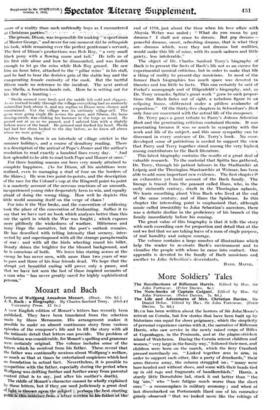Mozart and Bach
Letters, of Wolfgang Amadeus. Mozart. (Dent. 10s. 6d.) J. S. Bach : a Biography. By Charles Sanford Terry. (Okfx rl University Press. £1 Is.)
A NEW English edition of Mozart's letters has recently been published. They have been translated from the selection made by Hans Mersmann: His arrangenient makei it possible to make an almoSt continuous story from various episodes of the composer's life and to fill the story with all the intimate detail that letters can provide. The problem of translation was considerable, for Mozart's spelling and grammar were certainly original. The volume includes some of the letters which he received from his father. These _reveal that the father was continually anxious about Wolfgang's welfare; so much so 'that at times he entertained suspicions which had no foundation in actual fact. -Nevertheless; it is possible to sympathize with the father, especially during the period when Wolfgang was drifting further and further away from -parental control (that is to say, just after his mother's death).
The riddle of Mozart's character cannot be wholly explained by these letters, but if they am used judiciously a great deal of is-thrown upowtheitect :peThaps_tke hest starting ih
end of. 1178, just about the time when his love affair with :Aloysia Weber was ended : " What do you mean by gay -dreams ? I shall not cease to dreain: Hat gay drearns---:- .peaceful dreams, sweet, refreshing dreams, that is what they -arc—dreams which, were they not dreams but realitieS, -would make this life of mine, with its much sadness and little ;gaiety, less intolerable."
The object of Dr. Charles Sanford Terry's biography of -Bach is to present the facts of Bach's life not as an excuse for -experimental musical criticism, but -in order to make that life a thing of reality to present-day musicians. In most- of the :former Bach biographies too much space was devoted to .theories and too little to facts. This can certainly be said of Torkel's monograph and of Hilgenfeldt's biography, and, as Dr. Terry remarks, Spitta's great work " grew to such pmpoi;. Lions that Bach fades out of sight, a nebulous figure in an eclipsing frame, obliterated under a pitiless avalanche of exposition." Of the thirty-five chapters in Schweitzer's Back only four are concerned with the actual life of the-composer.
Dr. Terry pays a great tribute to Parry's Johann Sebastian Bach and the penetrating criticism contained therein. It was penetrating because it was so much in sympathy with the work and life of its subject, and this same sympathy can be discerned in every sentence of Dr. Terry's book. No over- developed sense of patriotism is needed to support the view that Parry and Terry together stand among the- very highest among contributors to the Bach literature.
. This latest biography contains the results of a great deal of valuable research. To the material that Spitta has gathered, Dr. Terry, through his patient labours in the Stadtarchiv at Leipzig and the Thuringian Staatsaichiv at Weimar, has been able to add some important new evidence.. The first chapter is, an exhaustive yet lucid account of the Bach family. The lineage is traced from the peasant called Hans, who, in the early sixteenth century, dwelt in the l'huringian uplands; We learn something about Vitus Bach who lived at the end Of the same century, and of Hans the Spielman. Di thi.4 chapter the interesting point is emphasized that, although music called irresistibly to John Sebastian's ancestors, there was a definite decline in the proficiency of his branch of the family immediately before his coming.
The great value of this biography is that it tells 'the story with such exceeding care for proportion and detail that at the end we feel that we are taking leave of a man of single purpose, of real humility and unique courage.
The volume contains a large number of illustrations which help the reader to re-create Bach's environment and to Visualise the people with whom he came into contact. One appendix is devoted to the family of Each musicians and another to John Sebnitian's descendants.
BAsur. MAncE.






















































 Previous page
Previous page